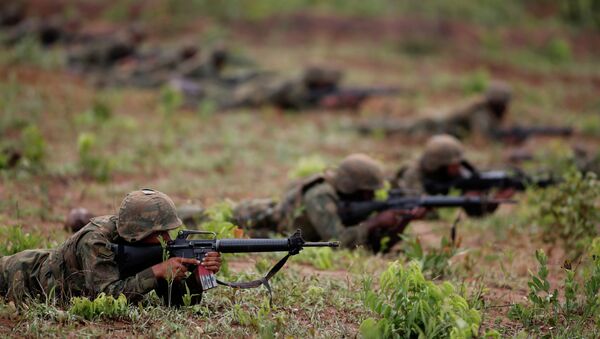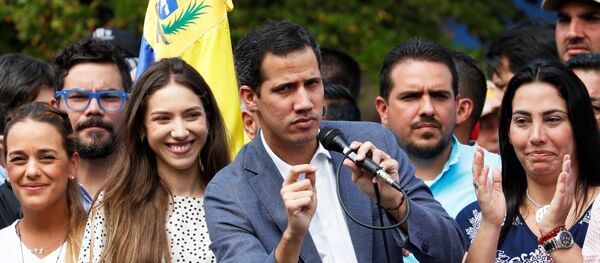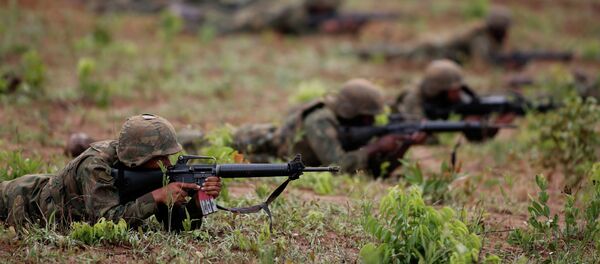After the meeting with the Brazilian minister, Bolton tweeted that "the US-Brazil alliance is stronger than ever" and noted that "mutual support for interim president Juan Guaido" and "logistics of humanitarian aid to the Venezuelan people" had been discussed at the meeting.
Just met with Brazil’s Foreign Minister Araujo at the White House. We discussed mutual support for Venezuela’s Interim President Guaido, including logistics for providing humanitarian assistance for the Venezuelan people. The United States-Brazil alliance is stronger than ever.
— John Bolton (@AmbJohnBolton) 5 февраля 2019 г.
For his part, Ernesto Araujo has not commented on the meeting with John Bolton or the subsequent meeting with US Secretary of State Mike Pompeo over social media.
Mauricio Santoro, a political scientist, foreign affairs specialist and professor at the State University of Rio de Janeiro (Universidade do Estado do Rio de Janeiro, UERJ), believes that this "silence" can be explained by caution and moderation. In an interview with Sputnik, the professor called the Bolsonaro government's attitude toward statements made by the American authorities "childish" enthusiasm.
"It is clear that for ideological reasons, in view of the fact that the Bolsonaro government is seeking rapprochement with the United States, this had influenced the way Brazil responded to the crisis in Venezuela. This is a very difficult question, a very difficult topic that must be discussed with great caution, yet we often see that Brazil is embracing ‘childish' enthusiasm for American statements, and this is dangerous", the professor said.
According to Mauricio Santoro, all the White House rhetoric against Venezuela should be perceived as an instrument of political pressure, just as happened recently with the war of words between Donald Trump and North Korean leader Kim Jong-un.
READ MORE: Venezuela's PDVSA Wants to Replace US Execs on Citgo Petroleum Board — Reports
If the US does decide on a military invasion, what would Brazil's actions be? The analyst warned that Brazil is unlikely to get support from its neighbours in the region.
"If this happens [a military invasion], even if the Bolsonaro government has this intention, to maximise Brazil's turn to the United States, the negative perception of this invasion will be so strong in Latin America that Brazil will eventually stand aside, even with all the government's desire to see something like this happening", the analyst believed.
Controversy "within"
The moderate position recently taken by Araujo is explained by the military's influence on the Brazilian Foreign Ministry, the expert said.
"We have never had a foreign minister who would have treated a foreign political leader with such enthusiasm […] In other words, if there wasn't this pressure from the military, it is not known what Araujo would do, what would be the foreign policy today. But, undoubtedly, the military highly values moderation, and is trying to restrain the government's most ardent initiatives in foreign policy", Santoro said.
Last Sunday, the Brazilian newspaper Folha de São Paulo published an article stating that the military from the government of Bolsonaro is "looking after" the Foreign Ministry, especially when it comes to Venezuela. At least two important generals are constantly talking with Araujo to monitor his activities.
The issue of deploying US military bases in Brazil, mentioned by Bolsonaro in an interview with the channel STB and supported by Minister Araujo, also worried the military, who immediately called this measure superfluous and inappropriate. Even the current vice president, a retired Brazilian Army General Hamilton Mourao, is acting in a way to change the Brazilian foreign policy position.
"When I talk about the military, I include the vice president on this list. Including the vice president, whom Brazil may need today, first of all, the vice president, who lived there [2002-2004], was a military attaché in Venezuela in a rather turbulent period at the beginning of Chavismo", Santoro noted.
Not only the support of the western position but also the lack of experience is affecting Araujo's activities, the specialist said.
"He was never an ambassador abroad. He never headed an embassy abroad, which is why it also makes him weak in internal disputes. The military gain the upper hand, being more experienced professionals, being able to exert more influence than the foreign minister himself", Santoro added.
READ MORE: Mysterious Turkish Firm Helped Venezuela Save $900 Mln in Gold — Reports
"I believe there are two possible options: either he becomes a more moderate figure, close to the views of the military, who can work together with the Minister of Economy [Paulo Guedes], or I think he will be removed", the expert said, stressing that at present there is a conflict within the government itself between the military and the ideological wing.
Santoro is inclined to believe that softening Araujo's position on Venezuela, as opposed to his hidden and well-known Trumpism, will play a major role in his survival as the Brazilian Foreign Minister, at least in the near future.
Views and opinions, expressed in the article are those of the speakers and do not necessarily reflect those of Sputnik




